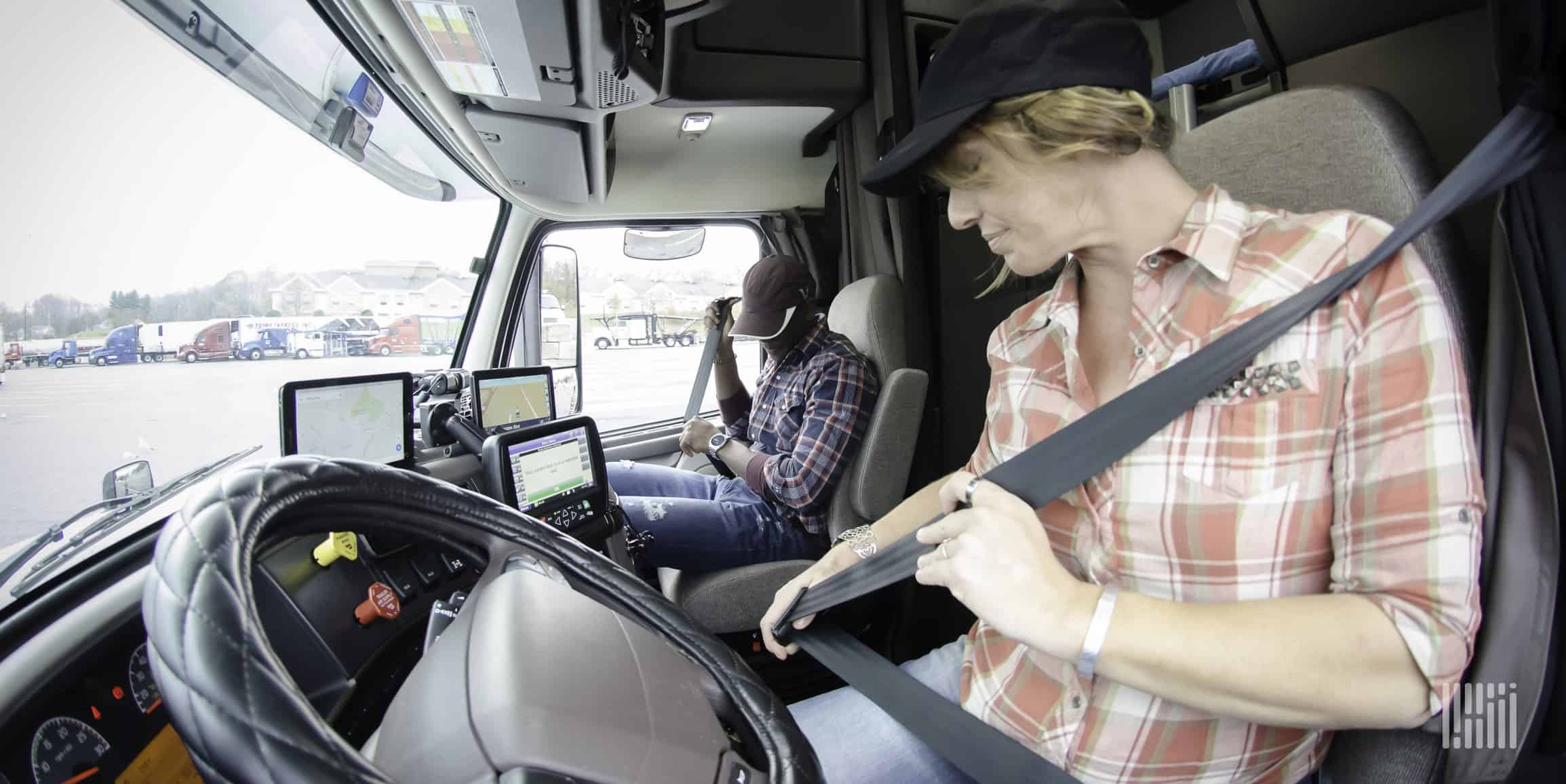If you’re a truck driver or fleet manager, you may have heard about truck telematics insurance.
Truck telematics insurance uses telematic devices installed in vehicles to monitor driving behavior and assess potential risks. But is truck telematics insurance right for you?
In this article, we’ll explore:
- The ins and outs of a telematic insurance policy
- Advantage and disadvantages of telematics coverage
- An example of how telematics insurance works for truckers
Whether you’re looking to save money on insurance or maintain a safe driving record, keep reading. Here’s what you need to know before signing up for truck insurance telematics.
What is truck telematics insurance?
So, in a nutshell, what is telematics insurance? Sometimes called “pay as you go insurance,” it’s a policy that uses telematics technology to monitor operational data from trucks. The telematics company collects driving behavior, speed, location, and engine performance information. It’s essentially a usage based insurance.
How does telematics work?
This data from the telematics tracking is analyzed to determine the risk level of the insured vehicle and its drivers and to adjust the insurance rates accordingly. The goal of truck telematics insurance is to encourage safe driving behavior and mitigate risks. It may result in lower insurance costs for the insured.
What is a telematics device?
The actual telematics device is a type of technology that’s installed to collect and transmit real-time data from a vehicle. It typically includes a GPS receiver, cellular or satellite communication capabilities, and various sensors that monitor and report information about the vehicle’s performance and location.
Read What is telematics and how does it work in trucking for more information.
Example of telematics insurance for truckers
Let’s imagine a truck driver named John who works for logistics company XYZ. XYZ decides to incorporate telematics insurance to improve driver safety and possibly reduce insurance premiums.
A telematics device is installed in John’s truck. This device records various data including his driving speed, the truck’s location, time of day he’s driving, instances of harsh braking or acceleration, and total distance he drives each day.
One day, while delivering goods, John has to navigate through heavy city traffic. He maintains a steady speed, doesn’t brake harshly, and avoids rapid acceleration. At the end of the day, the telematics device has collected all this data, and it’s sent wirelessly to the insurance company for analysis.
Over time, the data gathered shows that John is a careful, responsible driver. His average speed is within the legal limits, he doesn’t drive during high-risk hours (like late nights), and his braking and acceleration habits indicate a safe driving style.
Given his consistent safe driving behavior, the insurance company concludes that John poses a lower risk compared to some other drivers. As a result, XYZ may be eligible for a lower insurance premium under their telematics-based policy.
At the same time, the telematics data can also be used by XYZ’s telematics fleet management team to identify any potential areas for John’s driving improvement, further enhancing overall safety and efficiency.
Pros and cons of telematics insurance
Pros
Telematics benefits include:
- Reduced fuel costs: Fleet telematics systems can also help reduce fuel costs by monitoring truck speed, routing, and driver behavior to optimize fuel efficiency. This is one of the main advantages of telematics.
- Improved safety: Telematics trackers can provide real-time monitoring of driver behavior, which can help reduce the number of accidents and improve driver safety. The navigation telematics can be very helpful.
- Customizable coverage: The benefits of telematics include customization. Telematics providers may offer more flexibility in terms of types of coverage, depending on the data generated by the telematics device.
- Simplified claims processes: In case of an accident, telematics for insurance data can be used to quickly and accurately determine fault, which can lead to faster and more accurate claims settlements.
- Potential for lower premiums: Vehicle tracking telematics data can be used to more accurately assess risk, which may lead to lower insurance premiums for safe and responsible drivers.
Cons
The drawbacks of driver telematics are:
- Equipment costs: There may be additional costs associated with installing and maintaining the telematic insurance device on the truck.
- Privacy concerns: Some drivers may be uncomfortable with the level of data collection and monitoring by telematics companies required for telematics insurance.
- Data security risks: There may be concerns about the security and confidentiality of usage based trucking telematics. The data collected by the telematics vehicle tracking device, particularly in the case of data breaches or hacking attempts can be a concern.
- Potential for false positives: Telematics data may not always accurately reflect driver behavior or risk, which could lead to unfair penalties or higher premiums.
- Limited options: Not all insurance companies offer fleet management telematics insurance, so truckers may have limited options for coverage.
Telematics insurance may be a good fit for you
If lowered premiums, increased driver safety and reduced fuel costs sound appealing, you should consider telematics in trucks. On the other hand, if privacy and data security concerns are potential deal-breakers, perhaps now isn’t the right time. Telematic solutions will continue to evolve and expand, so chances are you’ll find the right fit now or very soon.
Explore more articles in our “Telematics insurance” article series
- What to expect from a telematics insurance policy for trucks
- How telematics reduces truck insurance rates
- Pros and cons of truck telematics insurance
- How to choose the best telematics insurance companies for trucks
FAQ
Telematics in vehicles refers to the use of technology to gather data on the vehicle’s performance, location, and driver behavior. This data is transmitted to a remote location where it can be analyzed and used to improve the vehicle’s efficiency, safety, and maintenance. Telematics systems typically include GPS tracking, engine and other vehicle systems sensors, and wireless communication capabilities. Fleet managers and insurance companies commonly use them to monitor vehicle usage, reduce fuel consumption, and improve driver safety.
Insurance companies use telematics to collect data on the driving behavior of their policyholders. This data includes speed, braking, acceleration, steering, and other factors related to their driving habits. By gathering this information, insurance companies can more accurately assess the risk of insuring a given driver. They can adjust premiums accordingly, offer discounts to safe drivers, and identify areas where policyholders may benefit from additional training or education. Telematics can also help insurance companies detect and prevent fraud, as well as provide valuable insights into claims management and vehicle safety.
No, telematics and GPS are not the same. GPS (Global Positioning System) is a technology that uses signals from satellites to determine the exact location of a vehicle. Telematics, on the other hand, combines GPS technology with telecommunications and computer science to collect and transmit data about a vehicle’s performance, location, and behavior for telematic companies. Telematics can provide information such as vehicle speed, fuel consumption, engine performance, and maintenance data.


